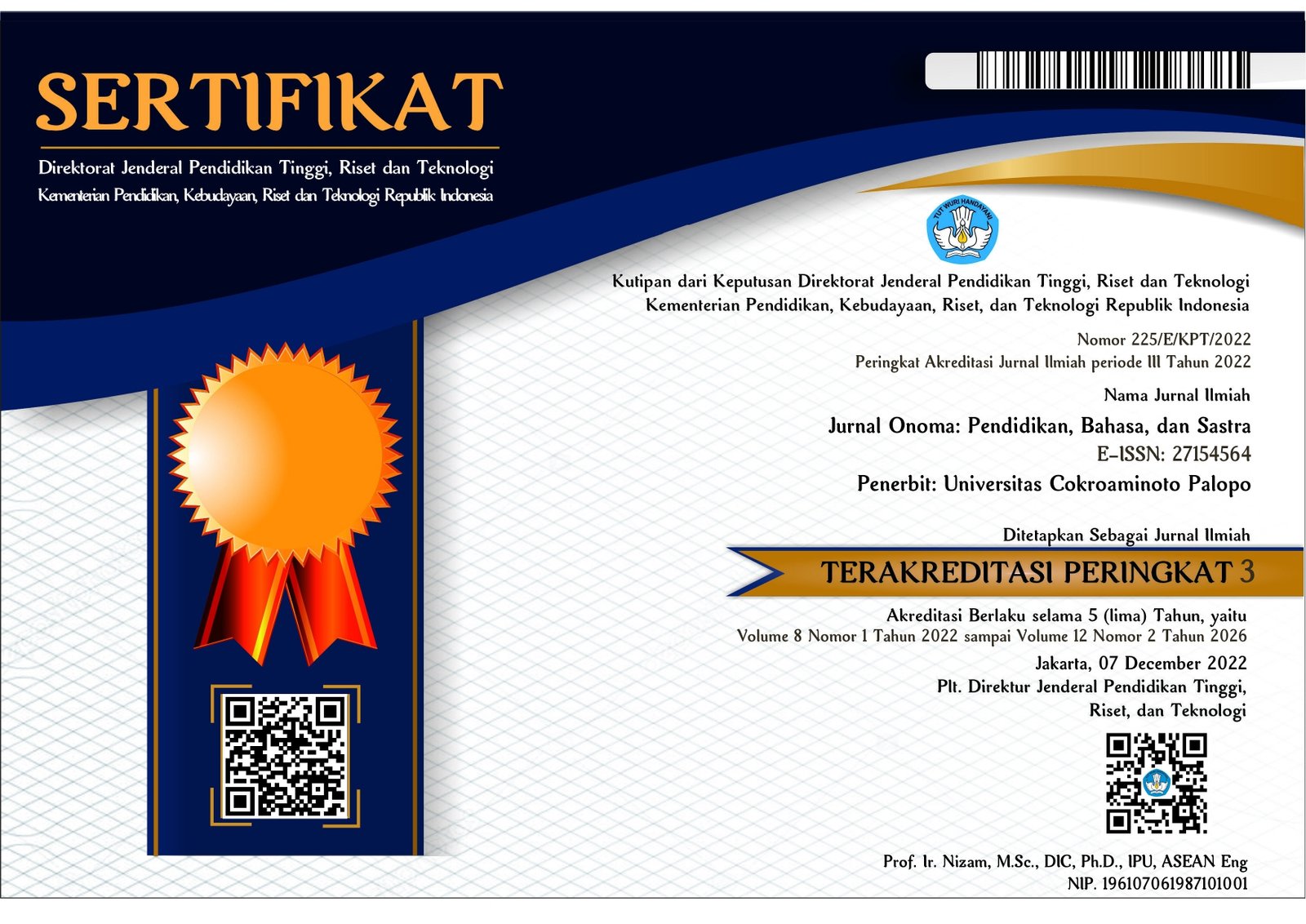Representasi Nilai Formal Teks Sastra pada Buku Pelajaran Bahasa Indonesia Fase D Kurikulum Merdeka: Model Norman Fairclough
https://doi.org/10.30605/onoma.v11i1.5150
Keywords:
nilai formal, teks sastra buku bahasa Indonesia Fase D, model Norman FaircloughAbstract
Penelitian ini bertujuan untuk mendeskripsikan nilai eksperensial, nilai relasional dan nilai ekspresif pada kosakata dan gramatika yang terdapat dalam teks sastra pada buku pelajaran bahasa Indonesia Fase D Kurikulum Merdeka. Melalui pendekatan kualitatif, penelitian ini mengamati dan menganalisis ideologi yang terkadung dalam teks sastra sesuai analisis wacana kritis model Norman Fairclough. Data penelitian berupa kata, frasa, klausa, kalimat dan paragraf pada teks sastra. Sumber data dalam penelitian ini yaitu teks sastra yang terdapat dalam buku pelajaran bahasa Indonesia Fase D Kurikulum Merdeka. Data dianalisis dengan menggunakan teknik dokumentasi, teknik baca, dan teknik catat. Hasil penelitian ditemukan pada fitur kosakata nilai eksperensial yaitu antonim; nilai relasional yaitu kata informal; dan nilai ekspresif yaitu penilaian positif. Pada fitur gramatika nilai eksperensial yaitu kalimat pasif; nilai relasional yaitu kalimat perintah; dan nilai ekspresif yaitu modalitas ekspresif. Setiap data yang ditemukan mengandung ideologi dan kekuasaan yang sejalan dengan pembentukan karakter peserta didik sesuai dengan Profil Pelajar Pancasila.
Downloads
References
Badan Standar Kurikulum dan Asesmen Pendidikan Kemdikbudristek. (2022). Dimensi, Elemen, dan Subelemen Profil Pelajar Pancasila pada Kurikulum Merdeka.
Eva Y. Nukman, Anna Farida Kurniasari, dan Helva Nurhidayah. (2022). Bahasa Indonesia SMP/Mts Kelas IX. Jakarta: Kementerian Pendidikan, Kebudayaan, Riset, dan Teknologi.
Fairclough, Norman. (1989). Language And Power; Relasi Bahasa, Kekuasaan dan Ideologi. Terjemahan Indah Rohmani-Komunitas Ambarawa. 2003. Malang: Boyan Publishing.
Fairclough, Norman. (2013). Critical Discourse Analysis: The Critical Study of Language. Routledge. DOI: https://doi.org/10.4324/9781315834368
Gusfitri, Maya Lestari dan Elly Delfia. (2021). Bahasa Indonesia SMP Kelas VIII. Jakarta: Kementerian Pendidikan, Kebudayaan, Riset, dan Teknologi.
Moleong, L. J. (2019). Metodologi Penelitian Kualitatif Edisi Revisi. Bandung: PT Remaja Rosadakarya.
Rakhma Subarna, Sofie Dewayani, dan C. Erni Setyowati. (2021). Bahasa Indonesia SMP Kelas VII . Jakarta: Kementerian Pendidikan, Kebudayaan, Riset, dan Teknologi
Downloads
Published
How to Cite
Issue
Section
License
In submitting the manuscript to the journal, the authors certify that:
- They are authorized by their co-authors to enter into these arrangements.
- The work described has not been formally published before, except in the form of an abstract or as part of a published lecture, review, thesis, or overlay journal.
- That it is not under consideration for publication elsewhere,
- That its publication has been approved by all the author(s) and by the responsible authorities – tacitly or explicitly – of the institutes where the work has been carried out.
- They secure the right to reproduce any material that has already been published or copyrighted elsewhere.
- They agree to the following license and copyright agreement.
License and Copyright Agreement
Authors who publish with Onoma Journal: Education, Languages??, and Literature agree to the following terms:
- Authors retain copyright and grant the journal right of first publication with the work simultaneously licensed under Creative Commons Attribution License (CC BY 4.0) that allows others to share the work with an acknowledgment of the work's authorship and initial publication in this journal.
- Authors are able to enter into separate, additional contractual arrangements for the non-exclusive distribution of the journal's published version of the work (e.g., post it to an institutional repository or publish it in a book), with an acknowledgment of its initial publication in this journal.
- Authors are permitted and encouraged to post their work online (e.g., in institutional repositories or on their website) prior to and during the submission process, as it can lead to productive exchanges, as well as earlier and greater citation of published work.

















